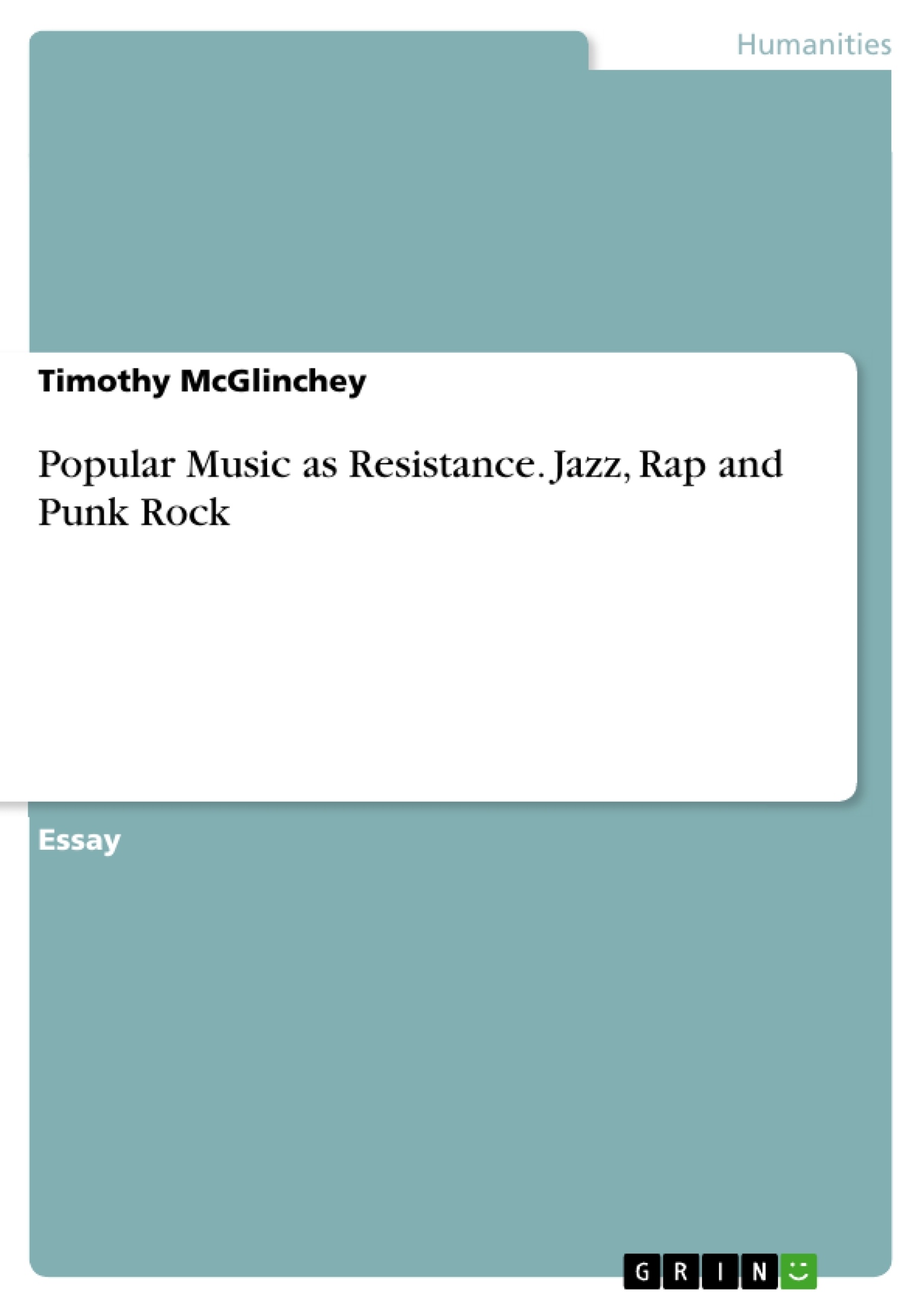Considering the integral role that popular music plays within contemporary culture, its capacity for cultural commentary and even change must not be underestimated. In this essay I will critically analyse the extent to which popular music can serve as an instigator and catalyst for social critique, and more importantly, resistance. As a result, I intend to propose that popular music only serves as an effective means of resistance when it involves interplay between both dominant and subordinate cultural groups in order to retain or change social order.
To do so effectively, I will be incorporating case studies from three distinct musical genres and eras, whilst complimenting these with theoretical and academic literature regarding resistance, and inevitably, notions of power. The three musical categories I wish to integrate into this discussion are jazz, rap, and punk rock, and the central pieces of academic literature that will be explored alongside these include Scott’s (1990) theory of “hidden transcripts”, and Foucault’s (1980) concepts of power. General insights into popular music and culture will also be interwoven throughout, including the works of Cihordariu (2011) and Fabian (1998).
Inhaltsverzeichnis (Table of Contents)
- Blackface Minstrelsy and Jazz
- The Use of Music as a Form of Resistance
- The Role of Hidden Transcripts
- Rap Music and the Development of an Oppositional Culture
- The Influence of Dominant and Subordinate Cultures
- The Role of Music in Group Unity
- Punk Rock and the Use of Music to Challenge Social Norms
- The Impact of Punk Rock on the Music Industry
- The Use of Music to Create a Sense of Community
Zielsetzung und Themenschwerpunkte (Objectives and Key Themes)
This essay aims to critically analyze the ways in which popular music can serve as a means of resistance, focusing on its ability to instigate and catalyze social critique and change. The essay argues that popular music is most effective as a form of resistance when it involves interplay between both dominant and subordinate cultural groups. The key themes explored in this essay include:- The role of popular music in challenging dominant ideologies
- The use of music as a tool for social commentary and critique
- The interplay between dominant and subordinate cultures in shaping resistance movements
- The concept of hidden transcripts as a form of resistance
- The role of music in fostering group unity and solidarity
Zusammenfassung der Kapitel (Chapter Summaries)
This essay examines the role of popular music in resistance movements across three distinct genres: jazz, rap, and punk rock. The first chapter explores the complex history of jazz music and its relationship to racial inequality in America. The chapter examines the emergence of blackface minstrelsy and its role in both perpetuating and challenging racial stereotypes. It argues that blackface minstrelsy, despite its intent to ridicule, opened up opportunities for black music and cultural expression. This chapter also introduces Foucault's concept of power as a framework for understanding the dynamics of resistance within blackface minstrelsy. The second chapter focuses on the work of Duke Ellington and his use of jazz music to express African-American cultural sensibilities and their struggle for freedom. This chapter introduces Scott's theory of "hidden transcripts" as a means of interpreting Ellington's music as a form of resistance. The chapter argues that Ellington's compositions, particularly his song "Daybreak Express," can be seen as examples of hidden transcripts, where complex musical artistry is used to convey socio-historic significance and challenge dominant ideologies. The third chapter examines the role of rap music in cultural critique and the development of an oppositional culture. This chapter draws on the work of Martinez, Fabian, and Cihodariu to explore how rap music can serve as a vehicle for expressing the experiences of marginalized groups and fostering communal resistance. The chapter argues that rap music's ability to organize resistance and draw on diverse genres of representation and performance plays a key role in shaping an oppositional culture.Schlüsselwörter (Keywords)
This essay explores the key concepts of popular music, resistance, cultural critique, social commentary, dominant and subordinate cultures, hidden transcripts, oppositional culture, group unity, and the role of music in social change. The essay draws on the theoretical frameworks of Foucault, Scott, Martinez, Fabian, and Cihodariu to examine the complex relationship between popular music and resistance movements.Frequently Asked Questions
How can popular music serve as a form of social resistance?
Music serves as a catalyst for social critique and resistance when it involves interplay between dominant and subordinate cultural groups to challenge social order.
What are "hidden transcripts" in the context of music?
Based on James C. Scott's theory, hidden transcripts are coded messages of resistance within the music of marginalized groups, such as Duke Ellington's jazz compositions.
Which musical genres are analyzed in this essay?
The essay focuses on three distinct genres: Jazz (and Blackface Minstrelsy), Rap, and Punk Rock.
How did Punk Rock challenge social norms?
Punk rock used music to disrupt the mainstream industry and create a sense of community through overt defiance and critique of social structures.
What role does Rap music play in cultural critique?
Rap serves as a vehicle for marginalized groups to express their experiences and organize communal resistance against dominant ideologies.
- Citation du texte
- Timothy McGlinchey (Auteur), 2015, Popular Music as Resistance. Jazz, Rap and Punk Rock, Munich, GRIN Verlag, https://www.grin.com/document/322770



